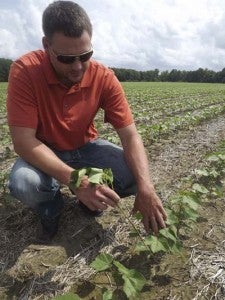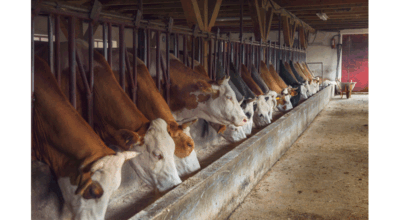Southampton extension agent helps in discovering which seed varieties do best in area
Published 9:55 am Wednesday, June 26, 2013
COURTLAND—As farmers in Southampton County can verify, the Virginia Cooperative Extension office in Courtland does more than dispense helpful agricultural advice through a newsletter. Extension agent Chris Drake is quite often in the fields analyzing how crops are progressing or not, depending on a number of circumstances, such as location, soil and weather.

Chris Drake, extension agent for Southampton County, shows how a cotton variety is progressing on a test field in Courtland. The office regularly conducts tests for seed companies to determine which variety will provide the best yield. — STEPHEN H. COWLES/TIDEWATER NEWS
More specifically, the office also regularly conducts field tests by growing crops such as cotton or soybeans.
“I put in a lot of time and energy to this,” Drake said.
For example, in one field in Branchville there are 10 varieties of cotton replicated three times for the sake of statistical analysis, he said, adding, “This helps to account for variation in soil types across the field.”
On another field on Plank Road in Courtland, for example, Drake points out the progress of different types of cotton. Within them are check varieties, which would be one of the most popular kinds used as a way of comparing quality.
All this, he said, is to determine which variety will produce the best yield.
“With cotton and corn I contract with different seed companies and give support and deem what’s the best seed,” Drake said. “Yield is king.”
As far as the cotton and corn variety tests go, Drake solicits seed from seed companies based upon what they deem to be their best varieties for our area. They all get an equal chance to showcase their genetics.
When the bolls come to fruition, a 10-pound sample from that field will be taken for analysis to a lab in Arkansas, he said. However, places such as the Tidewater Agricultural Research Extension Center in Suffolk are also qualified. Either way, a micro gin is used to help in the study. Both tests are vital to providing a good data set for making variety choices the following year.”
The rest of the cotton in said field goes to Davis and Sons Inc., which does the actual planting, fertilizing, spraying and harvesting.
Having local farmers do the work provides what Drake calls a “real world scenario,” as opposed to one done by research scientists in controlled conditions.
“Management is at the farmers’ discretion,” he added.





